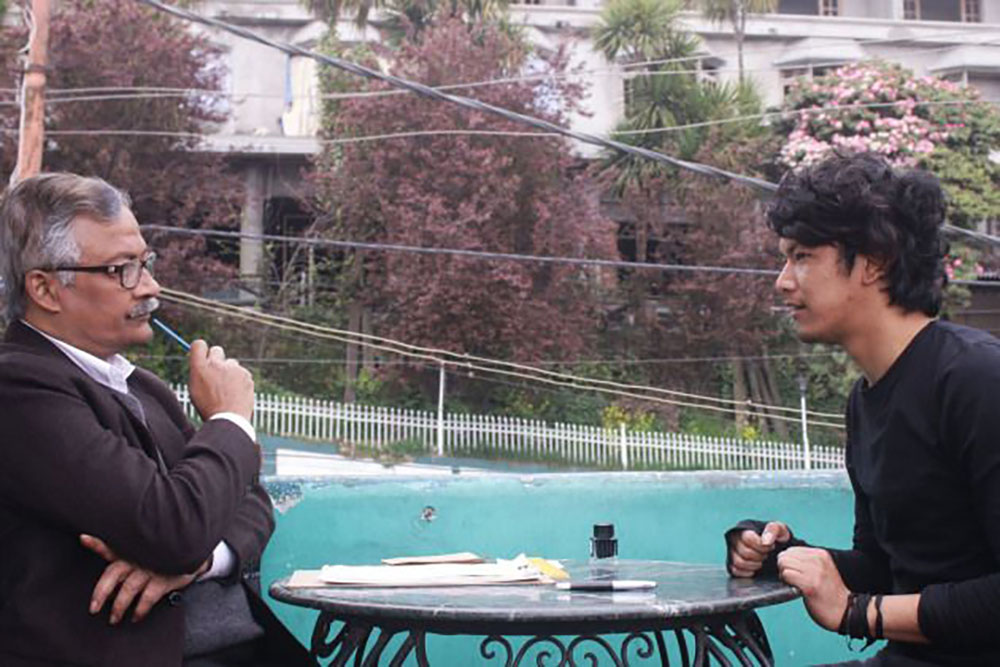One of the best displays of motion pictures is that they perform character studies on human behavior and presents these in a cinematic way. These stories enlighten us towards life, but give us a question on our thoughts on life. Many film-makers have tried this approach from inspiration to a dark tone; the short film “Knock Knock Knock” is in line with it.
The story starts at Darjeeling’s cafe, where an elderly gentleman named Dada (Shantilal Mukherjee), who is on his yearly vacation, sits at a corner table designing crosswords. It is his passion and pastime. A young man named Keta (Phuden Sherpa) sees the crossword he is conscientiously constructing. He is amazed by it and tries to connect with the older man and introduces himself as a tattoo artist.
Dada, who has a serious appearance, is exasperated with the distraction and does not respond to Keta. On the other hand, Keta senses he has finally seen someone with similar interests, so he wants to be friends with the older man. Dada and Keta’s quick friendship starts with patterns, and their existence follows in a circular rage to pursue the flow of vitality in their living. The narrative moderately unfolds loners; they certify security by creating their territories or originating their traditions. No matter how secluded Dada wants to remain, Keta finds his way to him as the story advances.
Both Dada and Keta are two men who are similar yet incompatible. As visionary artistes, they understand there is a twisted similarity that attaches their arts. However, Dada’s disinclination to let the world influence his private space is in variance to the young men’s eagerness for outreach.
The film’s writer/director Sudhanshu Saria’s film focuses on taking that challenge up a level. Because most of what would compose as traditional plot progress happens on intellectual standards rather than a physical ones, allying the two protagonists. In both his writing and direction, Sudhanshu Saria has triumphantly defined his two lead characters. There is no background story of the protagonist; it still compiles correctly within a short runtime of 37 minutes. Achyutanand Dwivedi’s cinematography is immaculate and exotic and impeccable. He manages to capture the quaintness and beauty of Darjeeling that helps the narrative and the characters.

Sudhanshu Saria smartly uses that last-mentioned impression to instigate a dark outline into the story and creates a portion of unnerving suspense. One of the critical things about the film is its uncompromising approach, which works sharply for narrative. There is no compromise to simplify the psychological subtext that set the motion for the story narrative.
One of the vital parts that help the vision of director and film the best way is the star cast’s stellar performance. As Dada Shantilal Mukherjee, a well-known character actor in Bengali cinema, his underrate method is remarkable for his complex role characteristic. Phuden Sherpa, as the young tattoo artist Keta, is equally incredible. He perfectly showcases the extrovert and a social misfit youngster.
“Knock Knock Knock” was screened at Arthouse Asia Film Festival in India along with a few more notable film festivals around the world. It won ‘Best Film’ at Worldfest Houston International Film Festival and ‘Best Screenplay’ at New York Indian Film Festival.
The short film ends on a confusing message which might not sate all; it leaves viewers with questions and debts on life, and the discourse it brings to the protagonist’s thoughts on the purpose of life is valid. The film has to soak us into the story very well in a meaningful and entertaining way in a short run-time. It’s a must watch for its crisp and tight narrative, followed by excellent performances of start cast.
You can check this film on Mubi.
2 Comments
Is that any other sources for the film other then mubi ?
It’s only available on Mubi .